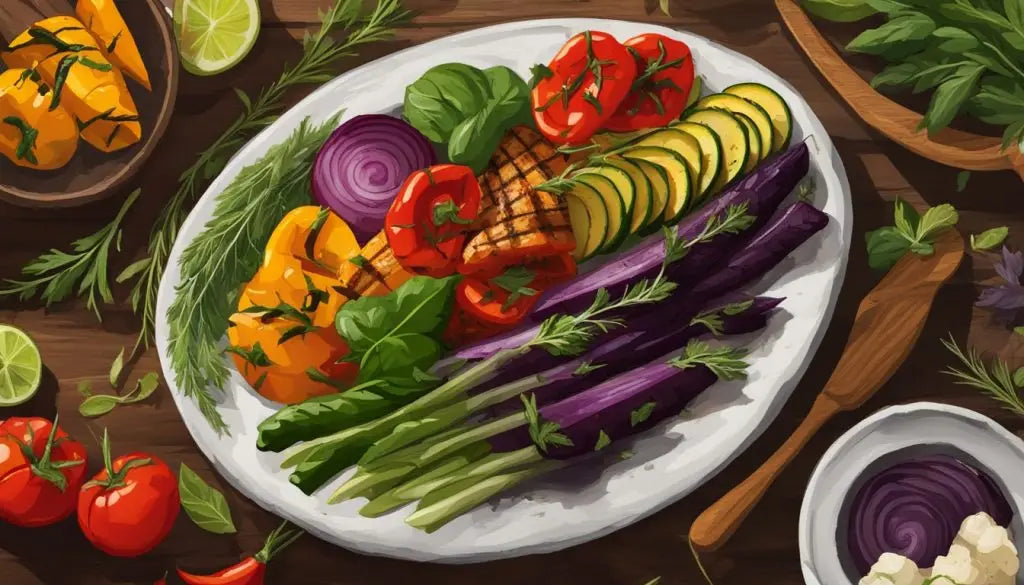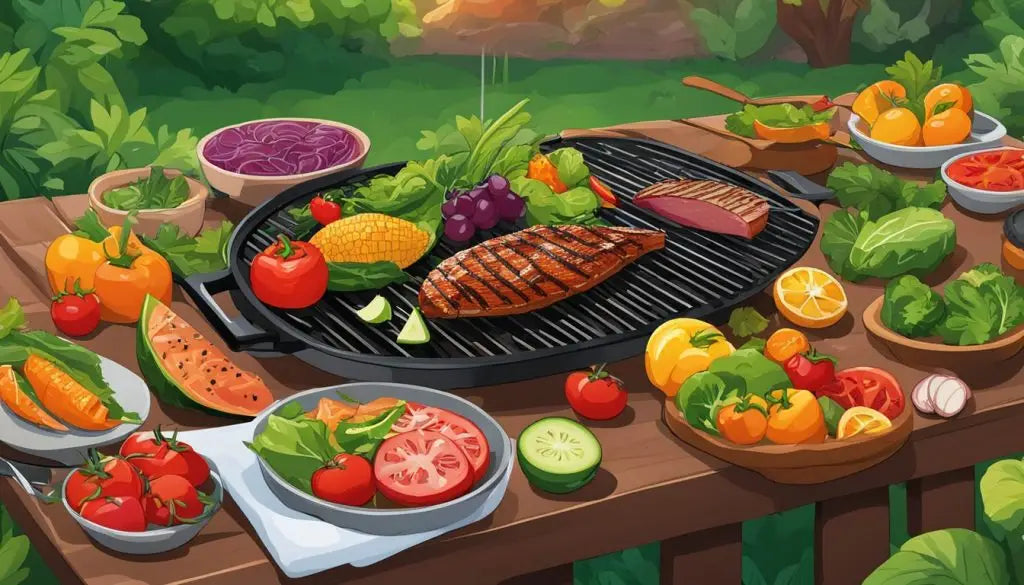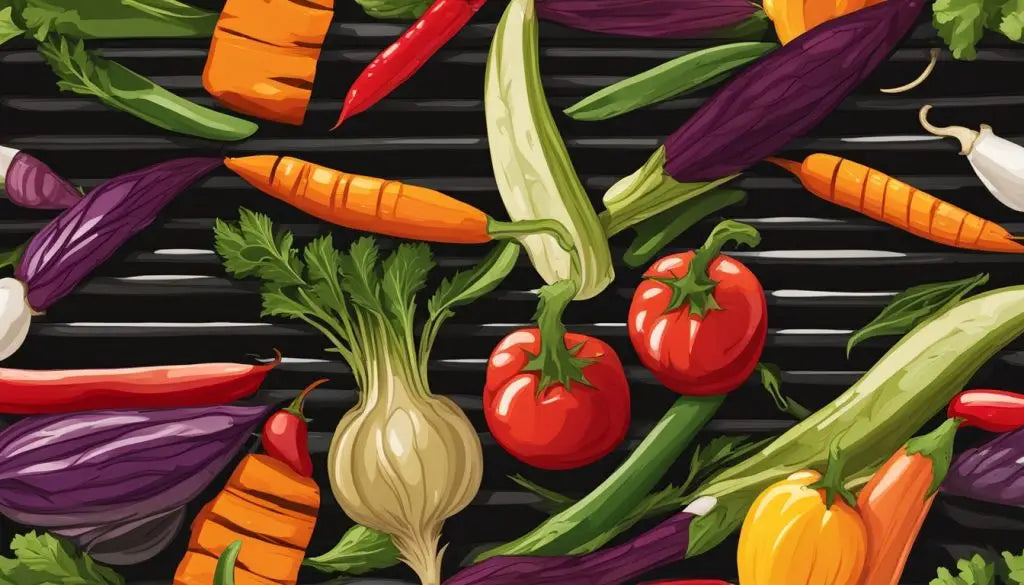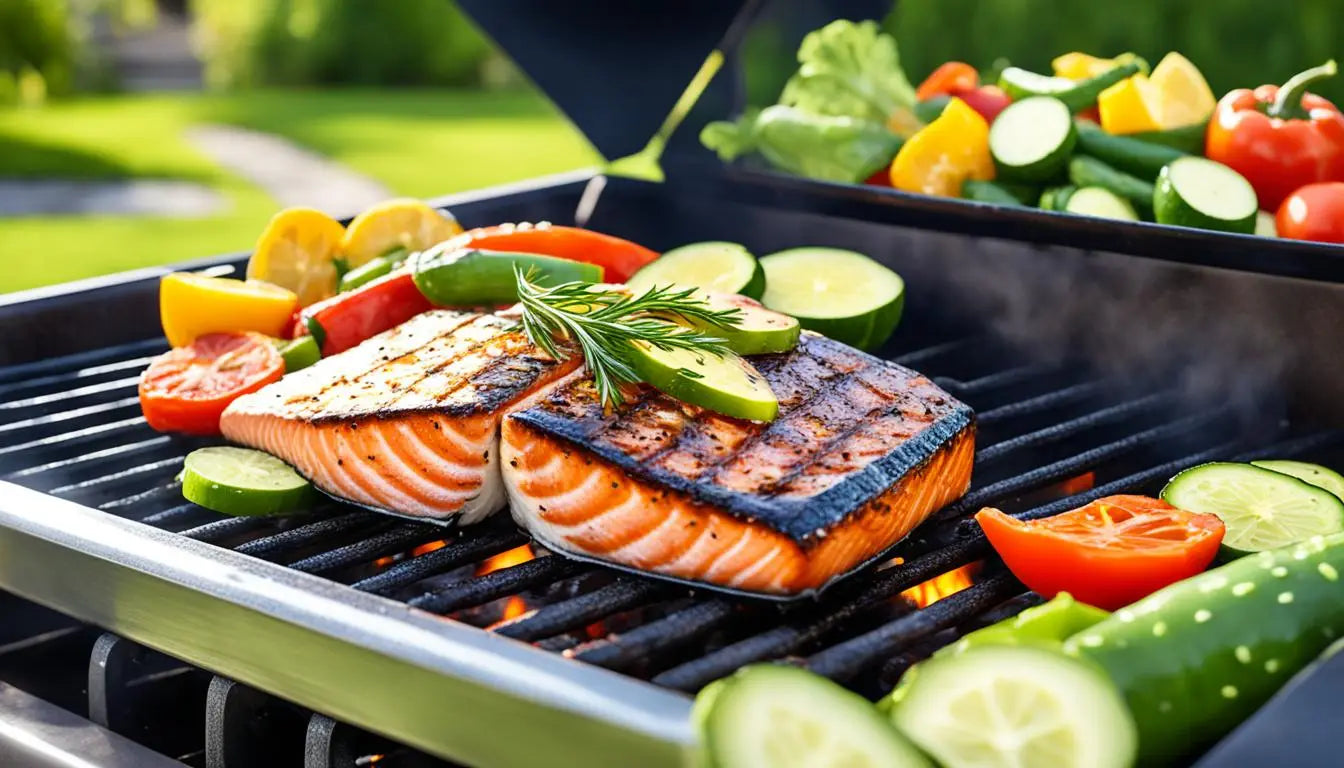The scent of steaks grilling fills the air, making everyone look around. It's not just the smell that grabs attention. It's also about a tradition that offers taste and health together. Grilling is an old cooking method. It's known for making nutritious meals. This method turns simple foods into amazing dishes. It keeps the food juicy and healthy. Indeed, grilling means eating well and living well.
Around the United Kingdom, health-focused folks see the grill as a key tool. They know the grilling benefits, like eating less fat and keeping important nutrients. This is why grills are central to healthy eating. Everyone, from busy London restaurants to quiet country homes, enjoys these benefits of grilling.
Key Takeaways
- Grilling is a technique that not only enhances flavour but promotes healthier eating.
- Nutritious grilling reduces unnecessary fat while preserving the integrity of vitamins and minerals.
- The use of restaurant-grade charcoal can elevate grilling, ensuring a high-quality experience.
- Understanding the health benefits of grilling can lead to better dietary choices and improved well-being.
- Grilling appeals to a wide audience, appealing to both gourmands and the health-conscious.
Unveiling the Nutritional Benefits of Grilling
Grilling can lead us towards healthier eating paths. This is because high-quality fuels like restaurant-grade charcoal make cooking both a delightful and wholesome experience. By grilling, we lock in essential nutrients and reduce unhealthy fats.
Preservation of Vitamins and Minerals
Grilling plays a key role in keeping vitamins and minerals in our food. The high heat seals in juices and nutrients, helping meat and vegetables keep their B-complex and vitamin C. This means grilling can be healthier than other ways of cooking.
Reduction of Added Fats in Meals
Grilling also means less added fats in our meals. Fat drips away when meat grills, unlike pan-frying which needs extra oil or butter. So grilling helps make our meals healthier without losing taste.
| Feature | Benefit |
|---|---|
| Burns hotter | Perfect sear and caramelization |
| Longer burn time | Cost-effective with less charcoal needed |
| Minimal smoke emission | Enhanced grilling experience |
| Natural and chemical-free | Eco-friendly and supports ecosystems |
| Distinctive smoky flavour | Taste enhancement for meats and vegetables |
| Versatile applications | Suitable for various grilling techniques |
It's crucial to pick the right charcoal for grilling. Not all charcoals are the same. Restaurant-grade options offer many benefits, like great heat and eco-friendliness. With prices from £8.08 to £24.49, getting the right charcoal is easy.
Choosing the right fuel simplifies enhancing your grilling skills. Try different flavours and enjoy the health benefits. Soon, grilling will be more than cooking. It'll be a step towards a healthier, tastier diet.
Exploring the Maillard Reaction and Flavor Enhancement
The magic of grilling goes beyond just the act itself. It involves a special flavor enhancement from the Maillard reaction. This is a key chemical change important to grilling science. When meat is seared on a grill, a tasty crust forms, full of rich flavors. The mix of amino acids and sugars gives grilled food its unique taste and appealing look.
Lumpwood charcoal is praised not just for its natural makeup but for the strong heat it provides during cooking. Grill fans love lumpwood charcoal because it boosts flavors without any additives. This keeps the true taste of their dishes intact.
https://www.youtube.com/watch?v=RhrDJoFP7h8
Lumpwood charcoal lights up fast, giving grillers the speed they need without losing the top-notch flavor from different woods. This quick lighting is due to the grilling science behind lumpwood. It gets to the right grilling temperature faster than regular briquettes.
Though lumpwood charcoal might not burn as long as briquettes, the intense heat it produces is key for the Maillard reaction. Being eco-friendly is another plus of using sustainably sourced lumpwood charcoal. It has a high-quality burn.
| Characteristic | Lumpwood Charcoal | Briquettes |
|---|---|---|
| Natural composition | Additive-free | Usually has binders/chemicals |
| Heat output | Superior | Lower |
| Ignition time | Faster | Slower |
| Burning duration | Shorter | Longer |
| Environmental impact | Clean burn, sustainable | Varies, often not as green |
For those in the food industry and restaurants, choosing top-quality lump charcoal is key. It ensures a steady flame and longer burning, perfect for great grilling. Plus, using high-quality lump charcoal means supporting the environment. Its production uses sustainable practices, leading to a smaller carbon footprint.
In short, the science behind grilling - the Maillard reaction, choosing the right fuel, and mastering the grill - elevates the cooking art. Opting for lumpwood charcoal supports this. It represents a more sustainable, tasty, and eco-friendly approach to classic grilling.
Health Benefits Grilling: A Closer Look
Grilling goes beyond giving food a great flavour. It also boosts health. The smell from the grill starts your hunger, but the real magic is in its health benefits. Grilling is a way to make eating both delightful and health-conscious.
Reduction in Calorie Intake
Grilling cuts down calories. This is because the fat drips off meats as they cook. So, you get a lower-calorie meal that's still very tasty. Grilling cooks food fast with high heat. This keeps meals flavourful without adding fat.

Minimizing the Risk of Chronic Diseases
Eating grilled foods often can lower your risk of long-term illnesses. Grilling doesn't need extra fats or oils. This helps keep your heart healthy and lowers the risk of diseases like heart issues and diabetes. Grill lean meats, fish, and lots of veggies for a diet that keeps you healthy.
| Cooking Method | Caloric Reduction | Risk of Chronic Disease |
|---|---|---|
| Grilling | Higher | Lower |
| Frying | Lower | Higher |
| Baking | Moderate | Moderate |
Looking at these benefits shows the value of grilling. It's good for your health and your taste buds.
Best Practices for Grilling with Health in Mind
Grilling in a healthy way means more than just starting the barbecue. It involves using nutritious cooking techniques to make meals that are tasty and good for you. It's also key to grill safely to prevent accidents and health issues. Here are top tips for health-focused grilling.
- Choose Lean Meats: Pick meats with less fat. Go for chicken, turkey, or fish for lean protein that grills well and is better for your health.
- Marinades Matter: Use herbs, spices, and citrus juice to marinate proteins. This adds flavour without unhealthy fats.
- Vegetables Galore: Fill your grill with lots of vegetables. They're not just nutritious but also make your grilled dishes taste better.
Be careful not to over char your food while grilling. This can help lower the risk of eating harmful, cancer-causing compounds. Also, cleaning your grill regularly prevents dangerous build-up.

Handling food safely and checking the temperature as you grill are crucial for grilling safety. A meat thermometer checks if meat is grilled safely, reducing the chance of illnesses. Below is a table with the safe temperatures for popular grilled foods:
| Food | Internal Temperature |
|---|---|
| Chicken Breast | 74°C (165°F) |
| Burgers (Beef, Lamb) | 71°C (160°F) |
| Pork Chops | 63°C (145°F) |
| Grilled Vegetables | Tender & Charred Edges |
- Preheat the grill before cooking for even cooking.
- Clean the grill after every use to stay safe and healthy.
- Keep raw and cooked foods apart to prevent contamination.
In summary, grilling can be both healthy and fun with the right knowledge and tools. By following these healthy grilling practices and keeping safety in mind, you're not just making food. You're creating nutritious and enjoyable cooking moments.
Grilled Vegetables: Adding Color and Nutrition to Your Plate
Grilled vegetables bring more than beautiful colors to your table. They boost your everyday diet with essential nutrients. Grilling various veggies makes them not only pleasing to the eye but also rich in vitamins and minerals. Grilling helps keep the vital nutrients that usually get lost in other cooking methods.

Varieties of Vegetables Best Suited for Grilling
When firing up the grill, pick veggies known for grilling well. Try sweetcorn, aubergines, and courgettes. These veggies grill perfectly. Bell peppers get a lovely char and sweet taste. Asparagus and cherry tomatoes become juicy and flavourful. Mushrooms offer a deep umami taste that's incredibly satisfying.
Maximising Nutrient Retention in Vegetables
To maximize the nutrients in your grilled vegetables, here are key tips:
- Grill with high heat for a short time to keep in flavours and nutrients.
- Don’t overcook to save vitamins and minerals.
- Handle the vegetables minimally while grilling.
- Grill them in their skin if you can to keep more nutrients.
Following these grilling tips can make your meals more nutritious. Grilled vegetables can be a colourful and healthy addition to your plate. They enhance your diet with every tasty, perfectly grilled piece.
Leaner Cuisine: Choosing the Right Proteins for Healthy Grilling
Summer means grilling time, and picking lean proteins for grilling is crucial. It helps you make delicious meals that are good for your health. Whether you like meat, fish, or veggie options, plenty of healthy protein choices make your barbecue both tasty and wholesome.
Spices are key in making your lean proteins taste great. They can turn simple meats into amazing dishes without adding extra calories. Spices not only add flavour but making healthy choices easier. You can choose from 24 BBQ spice rubs, offering 15 unique tastes that improve any meal. The World BBQ Spice Set gives you 5 special mixes, letting you enjoy delicious flavours guilt-free.
| Product Detail | Statistic |
|---|---|
| BBQ Spice Rub Options | 24 Available |
| Average Price | £11.61 |
| Flavour Varieties | 15 Types |
| Unique Spice Blends in Set | 5 Blends |
| Price Range | £6.95 - £60.95 |
| Range of Weights | 35g - 240g |
Adding lean proteins for grilling to your diet doesn't mean losing out on taste. Try lean meats like chicken breasts, turkey burgers, or pork loin. Fish such as salmon or trout are rich in omega-3 and make your barbecue healthy and varied. Tofu and tempeh are great for those who prefer plant-based proteins. They taste wonderful with the right spices.
- Select leaner cuts of meat for fewer calories and fats.
- Incorporate fish like salmon for a healthy dose of omega-3.
- Consider plant-based proteins for a varied grilling menu.
- Utilise flavourful spice rubs to enhance your proteins.
Sizzling barbecues can be healthy and enjoyable for everyone. Just choose the right proteins and spices. This way, each meal at the grill is a step towards a healthier life.
Addressing Common Health Concerns Associated with Grilling
Grilling is a popular cooking method, but it can cause health concerns with grilling. This is due to harmful compounds. To make grilling healthier, we need to mitigate these harmful compounds. Here's how we can enjoy grilled food safely and keep it healthy.
Approaches to Safeguarding Against Harmful Compounds
Using a gas grill can help reduce harmful compounds. Gas grills heat evenly and control temperature well.
- Consider a chimney starter for charcoal grilling without chemicals.
- Choose lumpwood charcoal for better flavor and fewer additives.
- Marinating your food can also cut down harmful compounds and boost taste.
Ensuring Proper Cooking Temperatures
Keeping proper cooking temperatures helps prevent undercooked meats and health risks.
| Grill Type | Advantages | Recommended Usage |
|---|---|---|
| Charcoal Grill | Distinct smoky flavor, ideal temperatures for searing | Preheat for 10-15 minutes, use direct cooking for steaks/burgers |
| Gas Grill | Even heating, consistent temperatures | Utilise precise temperature controls, thermometers |
| Electric Grill | Starts quickly, low maintenance | Suitable for beginners, ensure even cooking |
Electric grills are great for those new to grilling. They are easy to use. Having the right grilling tools is also important for safety and effective cooking.
Grilling healthily depends on being aware and using these tips. By doing so, we tackle health concerns with grilling. We ensure grilling is safe, tasty, and healthy.
Grill Safety: Preventing Food Poisoning and Promoting Well-being
Grilling is not just about great tastes or the smoky smell. It's equally about following grill safety and food handling tips. These ensure a top-notch dining scene. Avoiding food poisoning is a must to look after yourself and your guests. Let's explore how to grill safely and enjoyably.
Essential Food Handling and Preparation Tips
Proper grill safety starts with basic food handling. Always wash your hands before and after touching raw meats. This prevents harmful bacteria from spreading. Use separate chopping boards for raw meat and veggies to stop cross-contamination prevention. Also, keep meat at the right temperature before you grill to stop bacteria.
Getting your grill ready? Go for top-quality charcoal like restaurant-grade lumpwood charcoal. It gives off high heat and burns longer. Picking natural charcoal without chemicals also protects your food's taste and your health.
Cross-Contamination Prevention Strategies
To avoid mixing raw and cooked food, use smart cross-contamination prevention tips. Have separate utensils for each and maybe colour-code them. If you've touched raw meat with any tool, wash it or grab a new one. Always dish up cooked food on a clean plate, not one that had raw meat.
Grilling should be fun and safe. Keep these food handling tips in mind to make every meal tasty and healthy for everyone at your grill party.
| Charcoal Type | Burn Time | Temperature | Quality |
|---|---|---|---|
| Restaurant-Grade Lumpwood | Up to 4 Hours | High Heat Output | Premium, Natural |
| Hardwood Briquettes | Longer Burn Time | Consistent Heat | Premium, Longer Lasting |
Conclusion
The adventure in the world of grilling ends with recognizing its health benefits. Grilling is more than just cooking. It is a way to eat well and stay healthy. This cooking style keeps important vitamins and minerals. It also cuts down on calories without losing taste.
Grilling can play a big part in a healthy diet. It can help lower the chance of getting long-term illnesses. Choosing good foods to grill and cooking them right is key. This way, grilling makes meals that are tasty and good for us.
Looking back, we've learned a lot about grilling and health. Following good grilling tips and staying safe shows us something important. Enjoying grilled food and being healthy at the same time is possible. Grilling is essential for a healthy life.
FAQ
What are the health benefits of grilling?
Grilling is great for health. It keeps vitamins and minerals in food. It also cuts down on calories. Plus, it's linked to less risk of heart disease, some cancers, and diabetes.
How does grilling preserve vitamins and minerals in food?
Grilling uses high heat, which helps keep the food's nutrients. This way, the food stays nutritious.
Does grilling add extra fats to meals?
No, grilling doesn't need extra fats or oils. So, meals are lower in added fats.
What is the Maillard reaction?
The Maillard reaction happens when grilling. It makes the food taste and smell good.
How does grilling contribute to flavor enhancement?
Grilling makes food taste better. The Maillard reaction creates delicious flavors and aromas.
Can grilling help reduce calorie intake?
Yes, grilling lowers calorie intake by draining excess fats away while cooking.
Is grilling associated with a lower risk of chronic diseases?
Eating grilled food often can decrease the risk of heart disease, certain cancers, and diabetes.
What are some best practices for healthy grilling?
For healthy grilling, use lean proteins and lots of veggies. Always grill safely.
Are there specific vegetables that are best suited for grilling?
Yes, some vegetables are great for grilling. They taste better and can be healthier.
How can I choose the right proteins for healthy grilling?
Choose meat with less fat. Try fish, poultry, or plant-based proteins for healthy meals.
Are there any health concerns associated with grilling?
Grilling can create harmful compounds and undercooked meat poses risks. But, marinating and proper cooking can reduce these risks.
How can I ensure grill safety and prevent food poisoning?
Keep food safe by handling it properly. Use methods to stop cross-contamination and keep everyone healthy.

